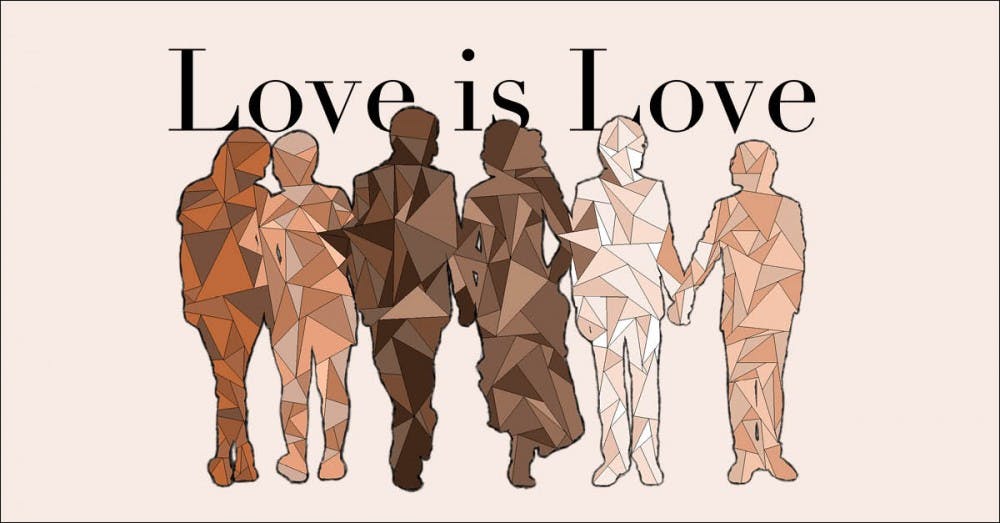How do I not be gay? The question wouldn’t stop pounding inside Kaleb Emery’s head as he punched it into the Google search bar on his Ipod Touch. At age thirteen, he began searching the Internet for answers about a label he didn’t yet understand. But he did know this: he was attracted to guys and in the religious household he was raised in that was not okay. Kaleb, now 20, said this was the lowest point in his life. He was in seventh grade when he realized he was attracted to boys and immediately sensed it was a problem that needed to be cured.
The idea that homosexuality is wrong has seen a huge shift between generations. According to a poll conducted by Pew Research Center, 70 percent of Generation Y supports same-sex relationships while only 35 to 49 percent of older generations do. Kaleb saw this lack of acceptance in his own household and hometown. Fearing he would lose friends and hurt his reputation in the conservative town, Kaleb didn’t come out as gay until he reached college. “I didn’t come from a terrible town, but it was a town very set in its traditional values. It was just very socially conservative and family-oriented,” he said.
Two weeks after starting college, Kaleb received a call from one of his hometown friends. He had only told a few friends from home about coming out, but word of his sexuality began spreading without his permission. “I was ready to come out but at the same time it wasn’t their right to tell that for me,” Kaleb said. “I wasn’t as mad as I would have been if I had been younger but I still was upset.” Kaleb’s biggest fear at that moment was that it would get back to his parents before he could tell them himself. “I just wanted to be the one to tell them, no one else,” he said.
Kaleb’s parents were surprised, but he also thinks they were just in denial. Since learning their son’s sexuality, Kaleb thinks they still don’t understand that it’s a huge part of his identity.
“I was just raised very religiously. It was hard for them to wrap their head[s] around, and it still is,” he said. “My dad especially isn’t necessarily in full support of my sexuality. My mom is curious about my love life but because it is not a love life she is used to she doesn’t really know how to go about it.”
Kaleb said it makes for an awkward conversation, because their generation doesn’t know how to deal with those kinds of questions.
As for his grandparents, Kaleb doesn’t plan on ever telling them. “They practice their religion more closely than my parents do. I’ve even heard some homophobic things from my grandma,” he said.
He says he’s not himself with his family. This disconnection between his family about not truly understanding a big part of who he is has helped him seek supportive relationships within his friend group.
“Being gay has helped me as a person because it has taught me how to surround myself with people who are comfortable with all aspects of me. I’m just very fortunate to have grown up in a generation that was able to have media access to these subgroups so that they do understand,” he said.
Kaleb notes that when he was younger an LGBT presence on social media helped him understand what it meant to be gay. “Social media has worked wonders for the gay community. The first step is coming to terms that being gay is a real thing. [Social media] got it out there.” Access to online stories and support gave him positive insight into his sexual orientation.
An increased LGBT community presence through television shows, social media, and news outlets is also what Kaleb believes separates the Millennial generation from older ones. “It humanizes the LGBT community because they can play characters on sitcoms. It makes people understand that this community is a part of us,” Kaleb said.
Kiersten Baughman, a professor in psychological science at Ball State, says the empathy we see within the Millennial generation is the product of a cultural shift in values. “Specifically, it’s a culture value that’s causing the country to become more politically liberal,” she said. This change in political views initiates a push for diversity. Like Kaleb mentioned, Kiersten says that forcing individuals to be exposed to diverse views creates tolerance and acceptance. “When culture transitions occur it takes a long time; we will continue to see these transitions in future children,” she said. Kiersten said the biggest reason for the delay period in normalizing new values is that people are averse to change.
Recent research reflects this shift in values. Statistics show that social change is accelerating among the Millennial generation, as they are more accepting of things that were previously considered taboo. According to Pew Research Center, the acceptance of same-sex relationships has changed over the past 15 years.
A 2001 poll conducted by the Pew Research Center showed that Americans opposed same-sex marriage by 57 percent while 35 percent were in favor. The results indicate that not long ago a majority of Americans disapproved the idea of homosexuality. A similar poll taken by the same group in 2015 indicates that Americans support same-sex marriage 55 percent with 39 percent still in disagreement. In just 14 years, Americans have become more supportive of homosexuality being a part of society.
Madison Egold knows the same familial tension, but a different kind of prejudice: one not based on similarity of gender, but a difference of color. She discovered that her interracial relationship, once considered taboo, was still unacceptable to the ones closest to her.
To continue reading, visit BallBearingsMag.com





